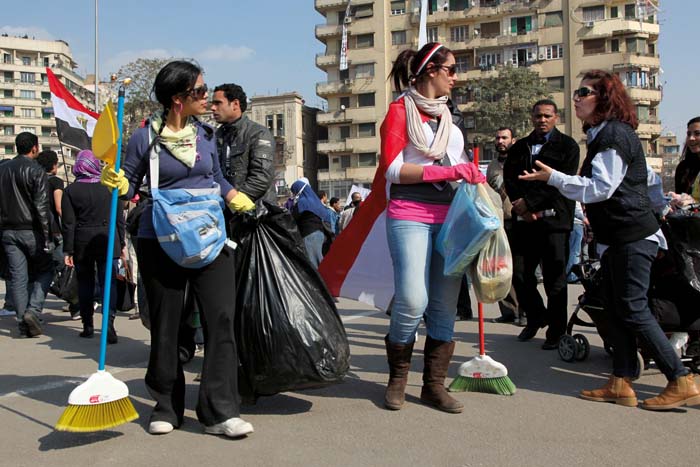|
Past the Protests: A Call to Civic Responsibility AUC students take part in the youth-led initiative to clean the streets of Cairo
 Youth all over Egypt, including AUC students and alumni, took part in clean-up activities in Tahrir and other parts of the country - Photographed by Omar Kamel '94
Youth all over Egypt, including AUC students and alumni, took part in clean-up activities in Tahrir and other parts of the country - Photographed by Omar Kamel '94
As the nation endured critical
circumstances on January 25,
it was crucial for all Egyptians,
whether male or female, young or old,
rich or poor, to attend to their civic
duty. It is through these trying times
that societies show what they are made
of, and Egyptians did not fail to deliver
with their magnificent sense of
cooperation, solidarity and persistence.
Tamer Sergany, a business
administration senior at AUC, was
engaged in neighborhood watches at a
time when police forces disappeared off
the streets of Cairo. "I knew
immediately that I had to go out when
I saw my dad pick up a club and walk
downstairs," he said. "People were on
every street corner with all sorts of
hand weapons, armed to defend
themselves, their families and their
homes. I was on the street with a metal
broom rod and a giant steel wrench, up
until dawn the next day. Every time I'd
patrol, more and more youth joined me
to protect the area. We set blazing fires
at every street corner and made sure to
stop every vehicle that passed us."
Sergany, who actively took part in
the nationwide protests against the
Mubarak regime, believed the
revolution would succeed against all
odds when violence was utilized
against the demonstrators. "I knew that
if Egyptians kept at the pace I saw and
experienced on January 28, then the
revolution would succeed," he noted.
"After seeing families, women,
children and the sheer number of
people marching to Tahrir Square,
that's when I told myself there's no
way things will be the same.
Something was going to change,
whether due to government fear or
the force of the people."
 Manal Hassan '11 painting a sidewalk in
Mohandiseen, Cairo - Photographed by Ahmed Rashed '11 Manal Hassan '11 painting a sidewalk in
Mohandiseen, Cairo - Photographed by Ahmed Rashed '11 Marveling at the sense of
responsibility and collaboration that
was manifest in Tahrir Square, Sergany
recalled efforts exerted by
demonstrators in Tahrir the day
before Mubarak stepped down. "On
February 10, I went to Tahrir again
only to find it was completely
different," he explained. "It was
blockaded at every entrance, with
regular citizens checking the IDs of
everyone who wanted to enter. I was
in sheer shock at the cleanliness of the
square and the cooperation of the
people. Everybody was very wellorganized,
and we all stood in unity."
While some of the demonstrators
may not have been politically active, they all shared one thing in common: a
dream and vision for a better Egypt. "I
wasn't into politics much, but I went to
protest against corruption," Sergany
said. "If there is any change that I'd like
to see, it would be ethics, equality and
the enforcement of human rights. No
more bribes or under-the-table deals just fairness and morality in every
aspect of Egyptian life and society."
Being a female in the midst of all
the violence did not deter Hagar
Eldidi, an economics major, from
attending to what she believed
were her responsibilities as an
Egyptian citizen. "I was present in
Tahrir Square on the day Mubarak
stepped down," she said. "It was
overwhelming and amazing to
finally witness such a moment.
People around us were literally
crying in happiness. It felt
absolutely wonderful." She added,
"I definitely anticipated the success
of the protests, especially when I
saw the determination and strong
will of the people. I feel very proud
being part of this revolution ––
a tiny dot among hundreds of
thousands in Tahrir Square who
together created such a strong force
that made all the difference."
But Eldidi's contributions were
not limited to joining the
demonstrators in Tahrir Square. After
protestors successfully managed to
overthrow the regime, Eldidi knew
that this newly found sense of
liberation, and indeed potential for a
better future, had to be supported
by positive action. "Cleaning the
streets was my favorite part," she
said. "I went to Tahrir on Saturday,
February 12, the day after Mubarak
stepped down, and the spirit was
amazing, with everyone there
celebrating and cleaning the area
where they camped. This mattered
to me because I saw that these
people really cared about the future
of this country and were serious
about rebuilding it the right way. It
proved to be a civilized revolution.
To me, it meant that if we could
clean Tahrir Square, then we could
also clean the rest of the country
together. I would also like to
commend all those who endured
sleep deprivation to protect us at
night. I saw neighbors get to know
each other for the first time."
Eldidi's sense of commitment
extended beyond Tahrir Square to
serve her own neighborhood. "I
collaborated with people from my
neighborhood in cleaning the area
and buying paint for the sidewalk,"
she said. "We arranged for a truck
to come and collect the garbage.
Many people were helping out,
including little children who were
actually doing a great job. I think it
was a very beneficial experience. It
taught the younger generations
good values. I hope that this level of
enthusiasm doesn't weaken over
time so that we can really continue
to give back to this country and live
a dignified life."
By Ghaydaa Fahim
|
